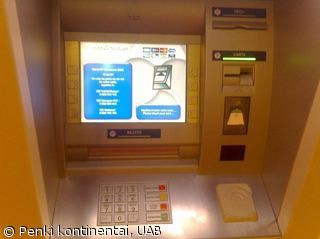Marked differences in the stages Europe's various national administrations have reached in moving towards e-government are highlighted in a new report from ICL.
Published:
6 December 2000 y., Wednesday
Although the majority of European governments believed that the offering of services via the Internet will result in future savings, none could offer timescales or a plan for when and how these savings would be achieved. The report from the leading e-business services company also draws attention to the lack of planning European governments have put in place for the changes that delivering services on-line will entail.
None of the governments interviewed for the report, "Europe's readiness for e-government", had developed full change management plans that revealed how they aimed to restructure and redistribute their resources.
ICL called on European governments to fully consider the costs and savings of e-government in light of its report and to ensure that e-government strategies are supported by effective change management plans. The report examines the e-government targets set in the EU's e-Europe 2002 action plan, and looks at how each country is progressing towards reaching the targets set for electronic service delivery.
It highlights initiatives that are already taking place around Europe in the move to e-government. Finland, for example, has launched 76 e-service projects and is confident it enjoys "big" cost savings, whilst other initiatives include the UK's heavily used open.gov.uk information portal (http://www.open.gov.uk/) and Greece's on-line tax forms. But "ICL believes that too many of the benefits are seen as isolated initiatives and that integrated, properly costed plans for the move to on-line government are lacking," said George Hall, director of corporate affairs at ICL.
Šaltinis:
electricnews.net
Copying, publishing, announcing any information from the News.lt portal without written permission of News.lt editorial office is prohibited.
The most popular articles
Software company announced new structure_ of it_s business.
more »
 Networking sites like Facebook and YouTube are changing politics.
more »
Networking sites like Facebook and YouTube are changing politics.
more »
 Vendor to service almost 4,000 existing ATMs and supply another 450.
more »
Vendor to service almost 4,000 existing ATMs and supply another 450.
more »
 The advent of deposit automation, facilitated in many ways by the implementation of Check 21, is not only improving check-handling processes at the self-service terminal – it also is improving handling within the bank branch itself.
more »
The advent of deposit automation, facilitated in many ways by the implementation of Check 21, is not only improving check-handling processes at the self-service terminal – it also is improving handling within the bank branch itself.
more »
 The Moroccan Post Office, Barid Al-Maghrib, has selected Bull to act as project manager on the automation project for its International Mail Center in Casablanca.
more »
The Moroccan Post Office, Barid Al-Maghrib, has selected Bull to act as project manager on the automation project for its International Mail Center in Casablanca.
more »
 Gemalto has taken home one of the most coveted technology prizes in Austin with its Smart Enterprise Guardian (SEG).
more »
Gemalto has taken home one of the most coveted technology prizes in Austin with its Smart Enterprise Guardian (SEG).
more »
 Banks in Australia are rushing to install gas detectors into their ATMs, as gas-explosive attacks on ATMs in the country continue to climb.
more »
Banks in Australia are rushing to install gas detectors into their ATMs, as gas-explosive attacks on ATMs in the country continue to climb.
more »
 EMC CEO Joe Tucci and Microsoft CEO Steve Ballmer showcase deep technology collaboration at New York CIO Summit.
more »
EMC CEO Joe Tucci and Microsoft CEO Steve Ballmer showcase deep technology collaboration at New York CIO Summit.
more »
 India-based mChek looks to offer its secured SIM-card-based mobile applications through partnership with Gemalto.
more »
India-based mChek looks to offer its secured SIM-card-based mobile applications through partnership with Gemalto.
more »
 Nearly one week after news emerged of the big data breach at Princeton, N.J.-based merchant acquirer Heartland Payment Systems Inc., it remains unclear how much damage actually happened and who did it.
more »
Nearly one week after news emerged of the big data breach at Princeton, N.J.-based merchant acquirer Heartland Payment Systems Inc., it remains unclear how much damage actually happened and who did it.
more »
 Wincor Nixdorf AG has announced the release of an enhanced security product for bank branches called ProTect.
more »
Wincor Nixdorf AG has announced the release of an enhanced security product for bank branches called ProTect.
more »